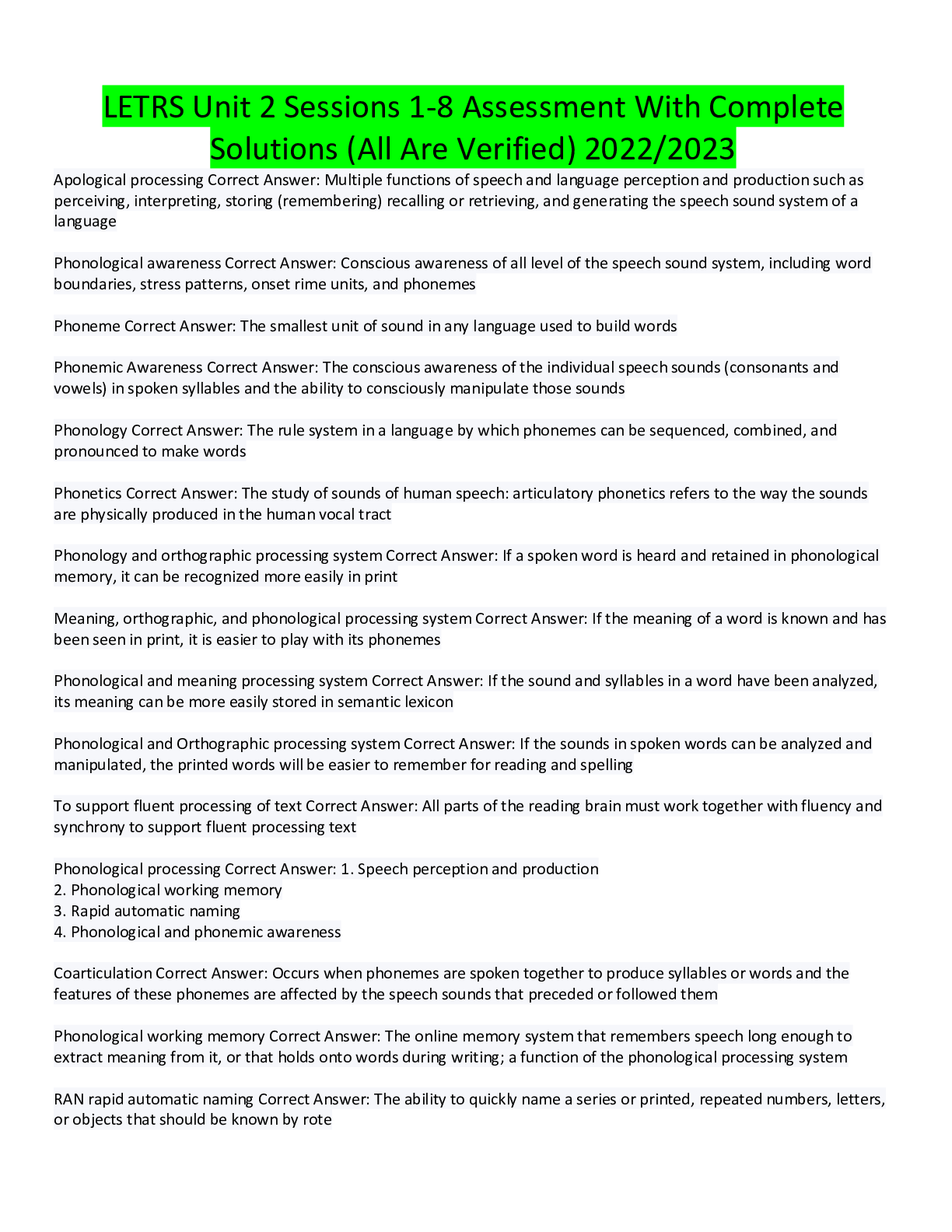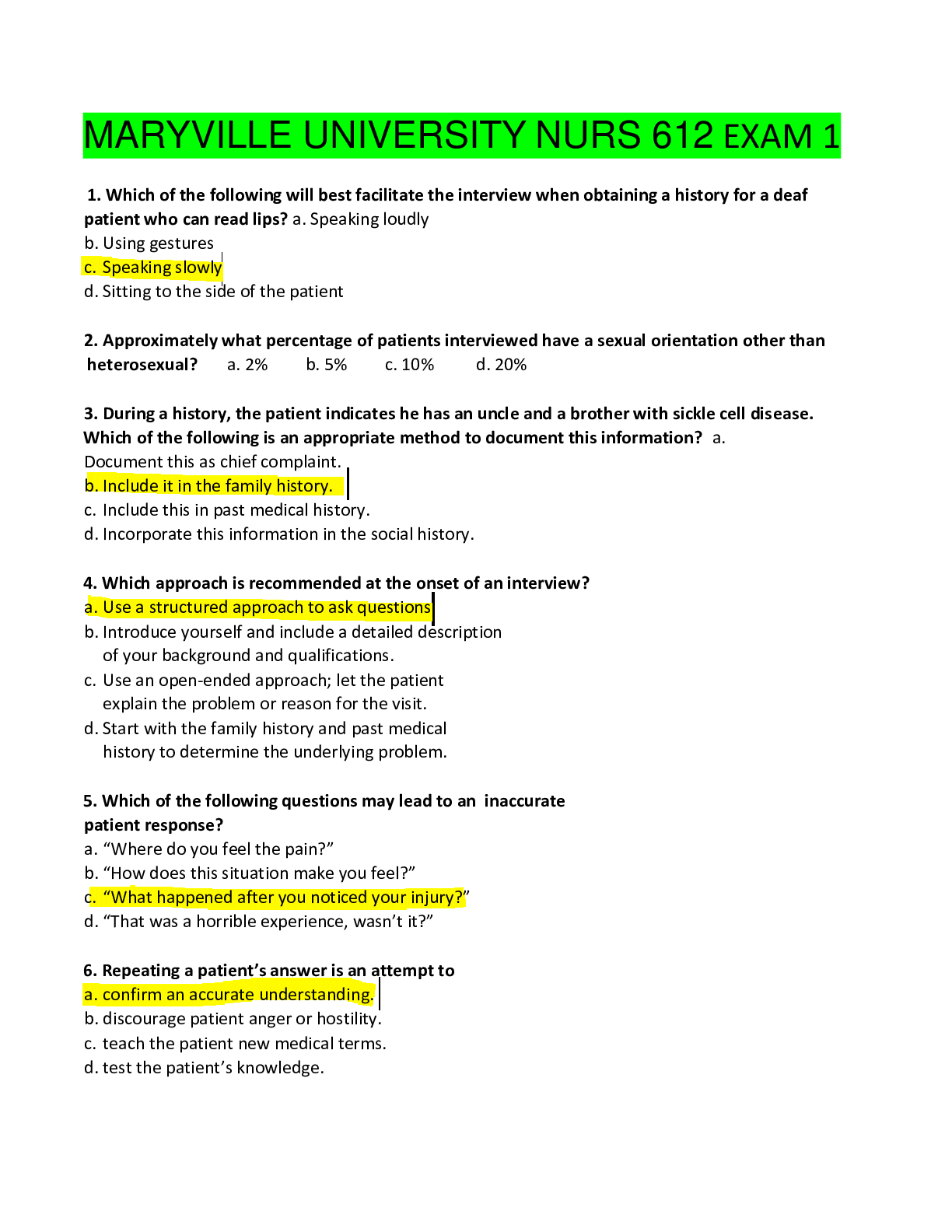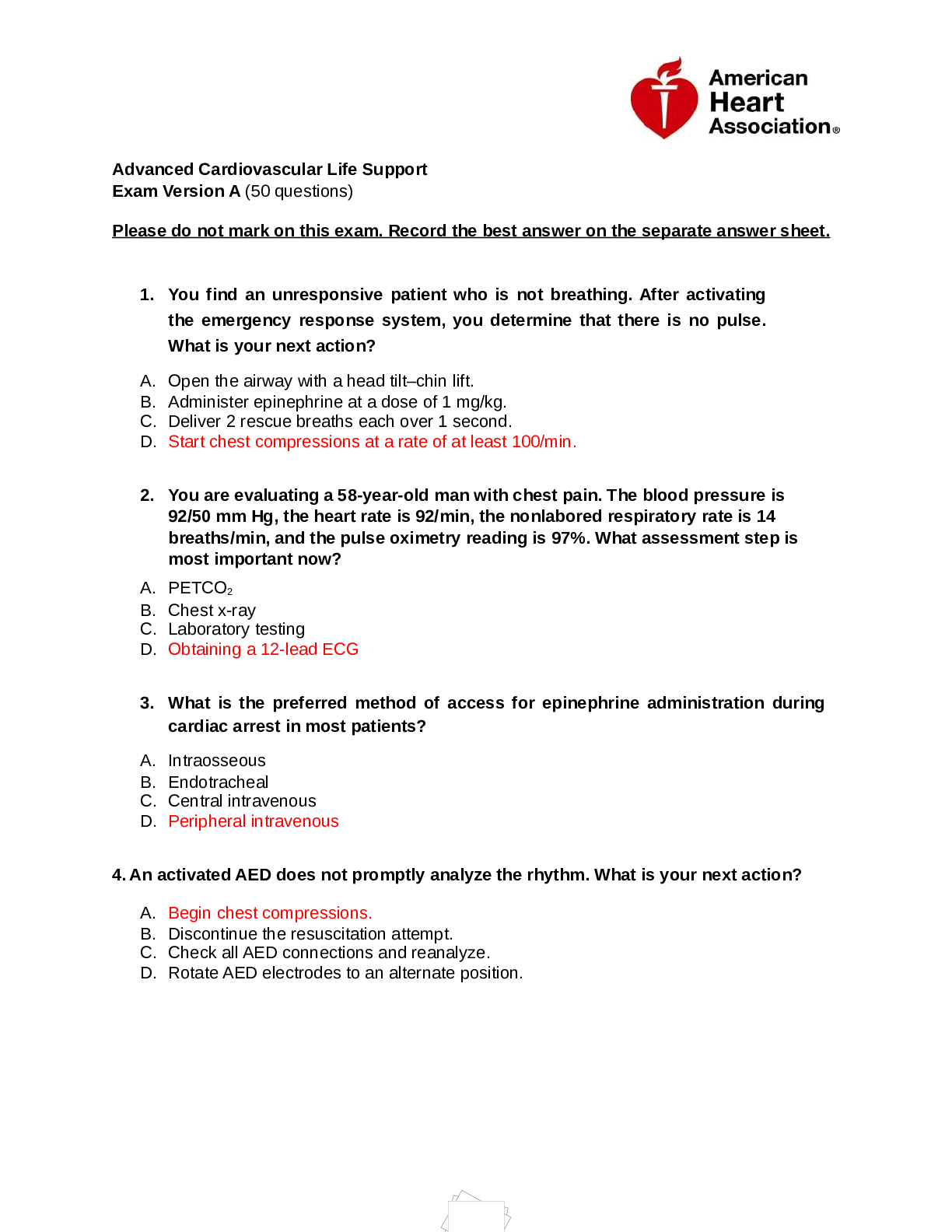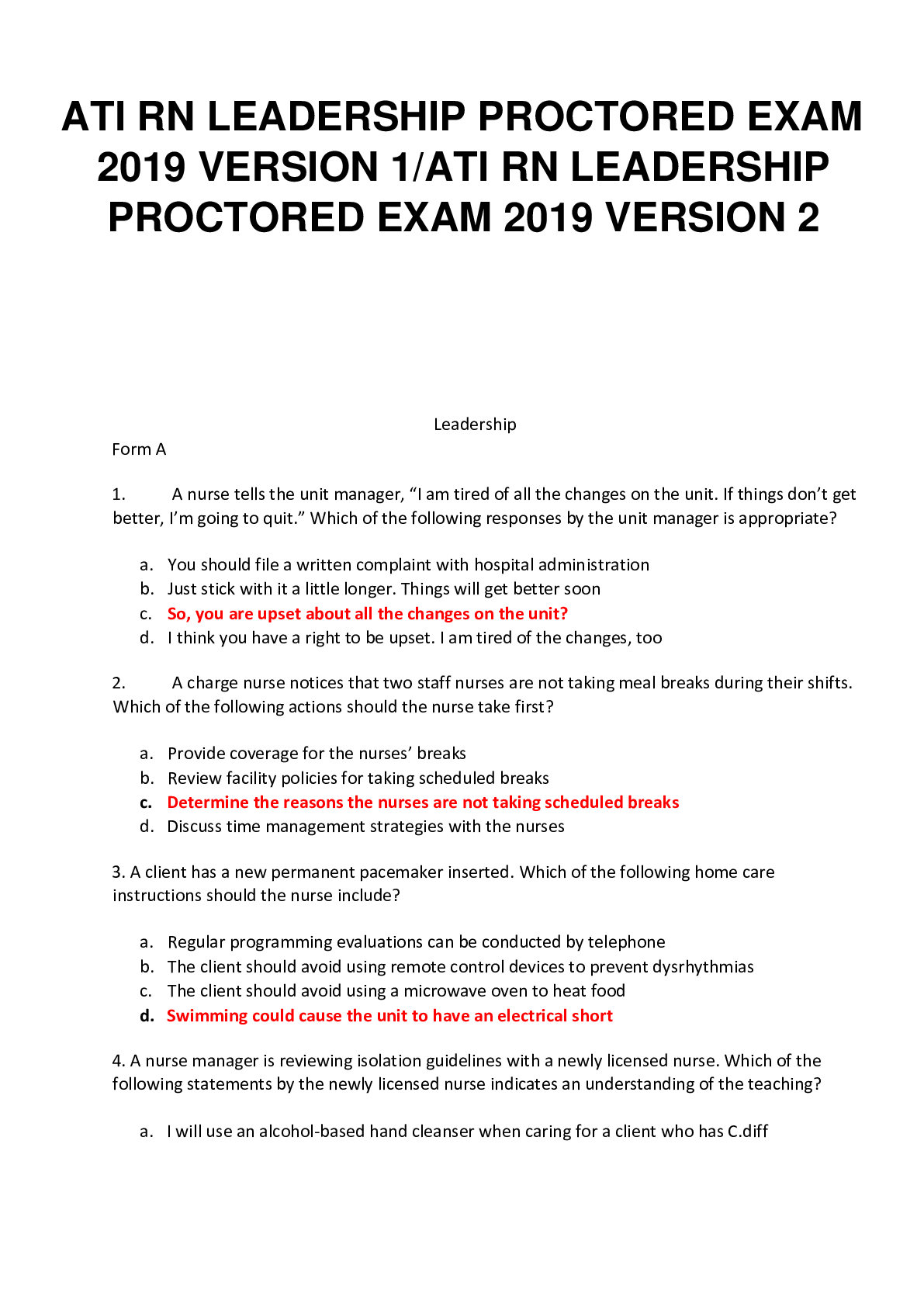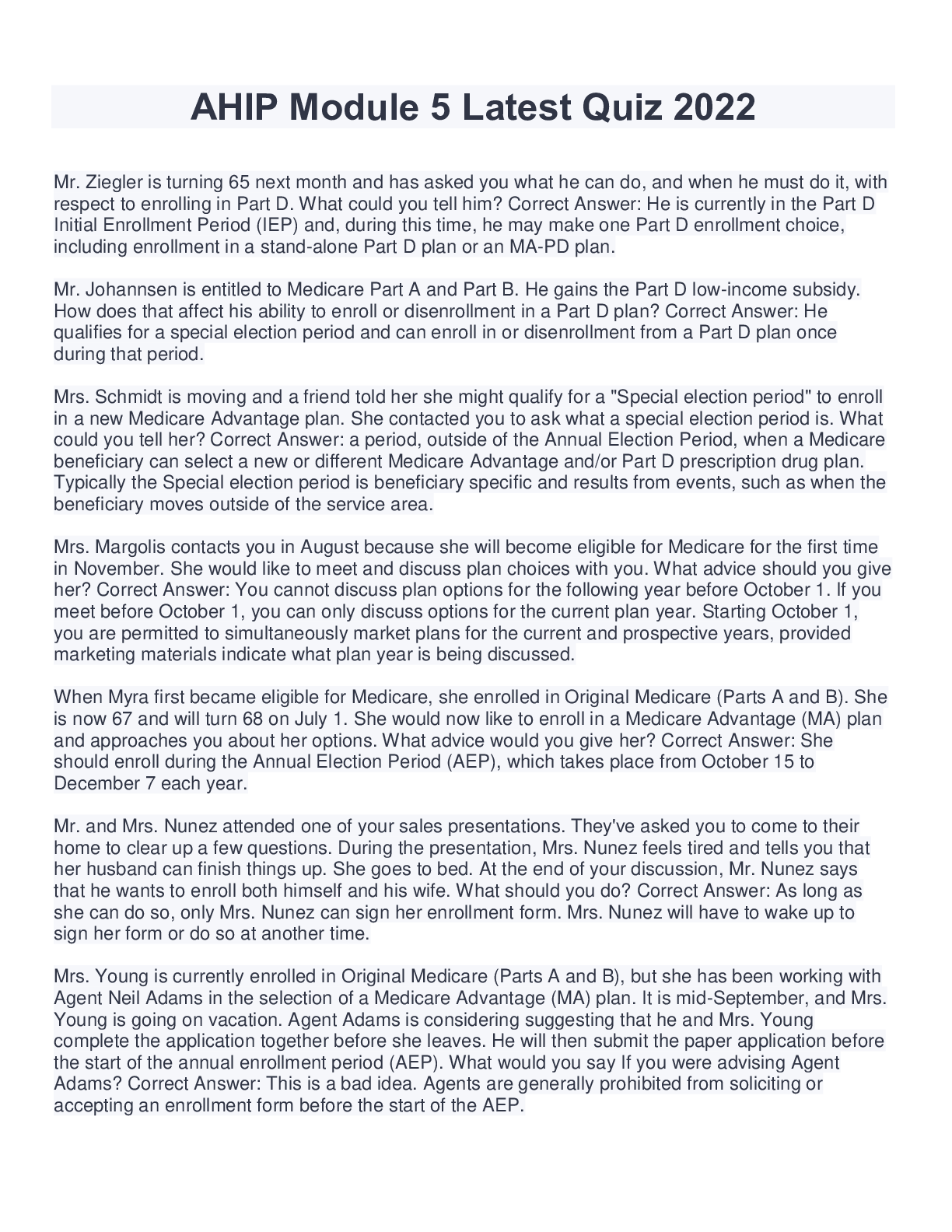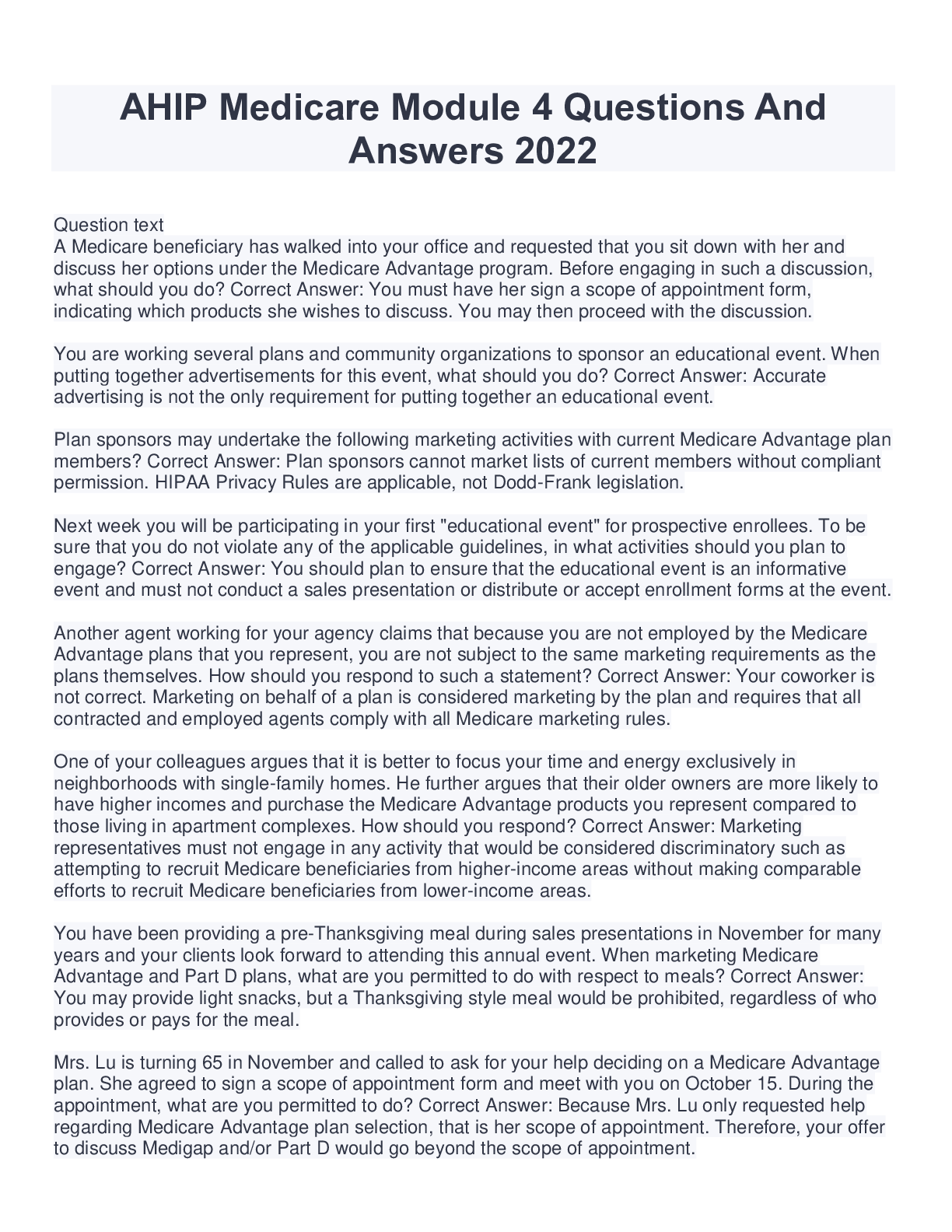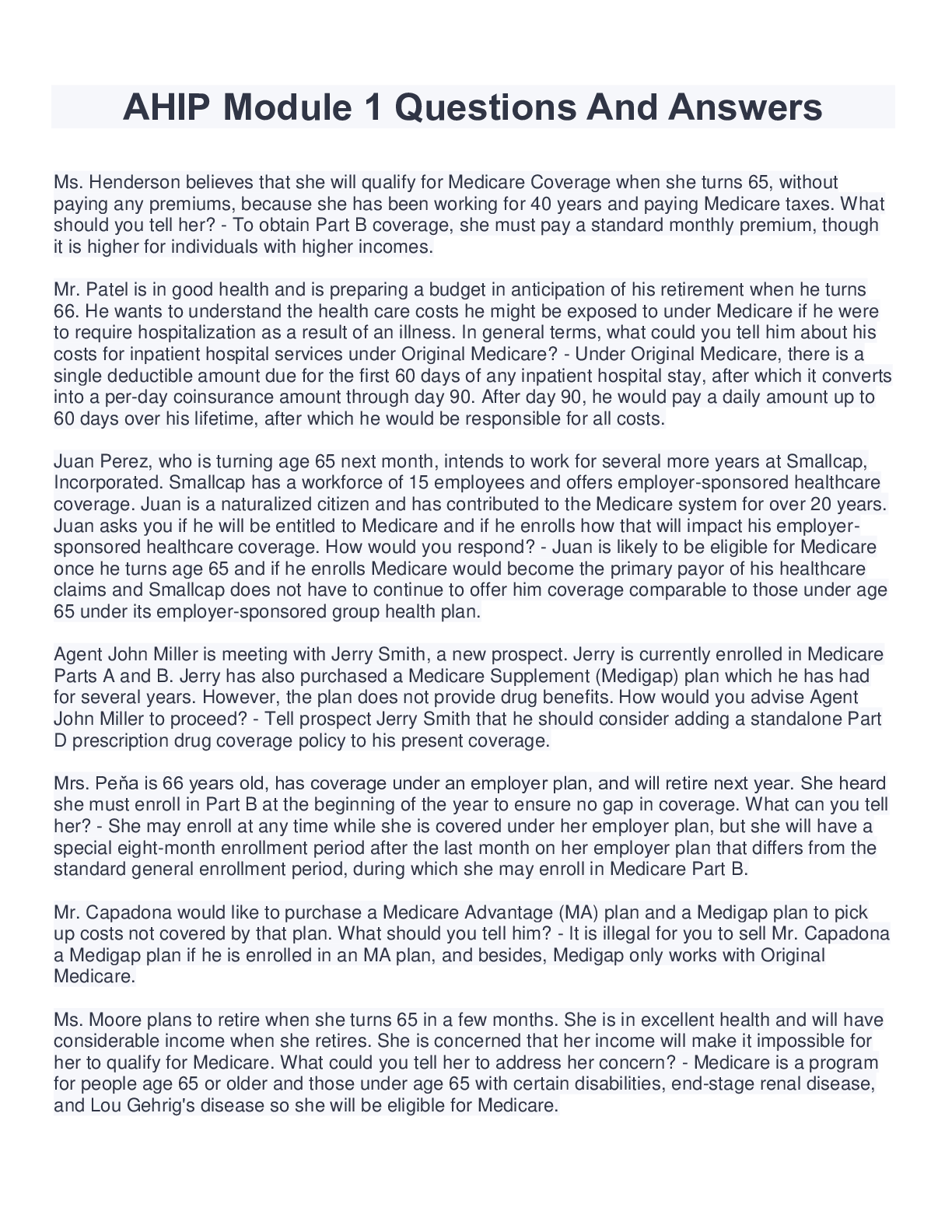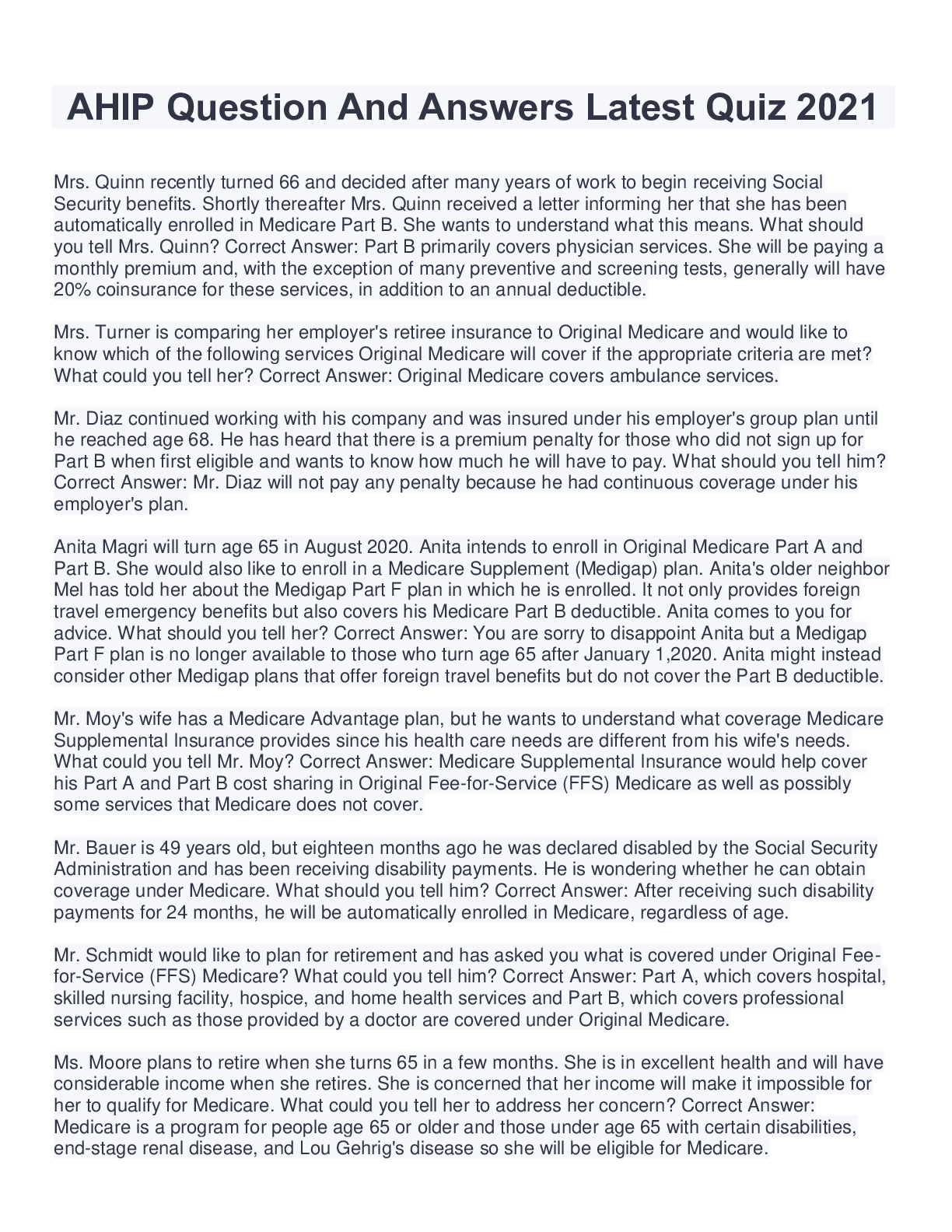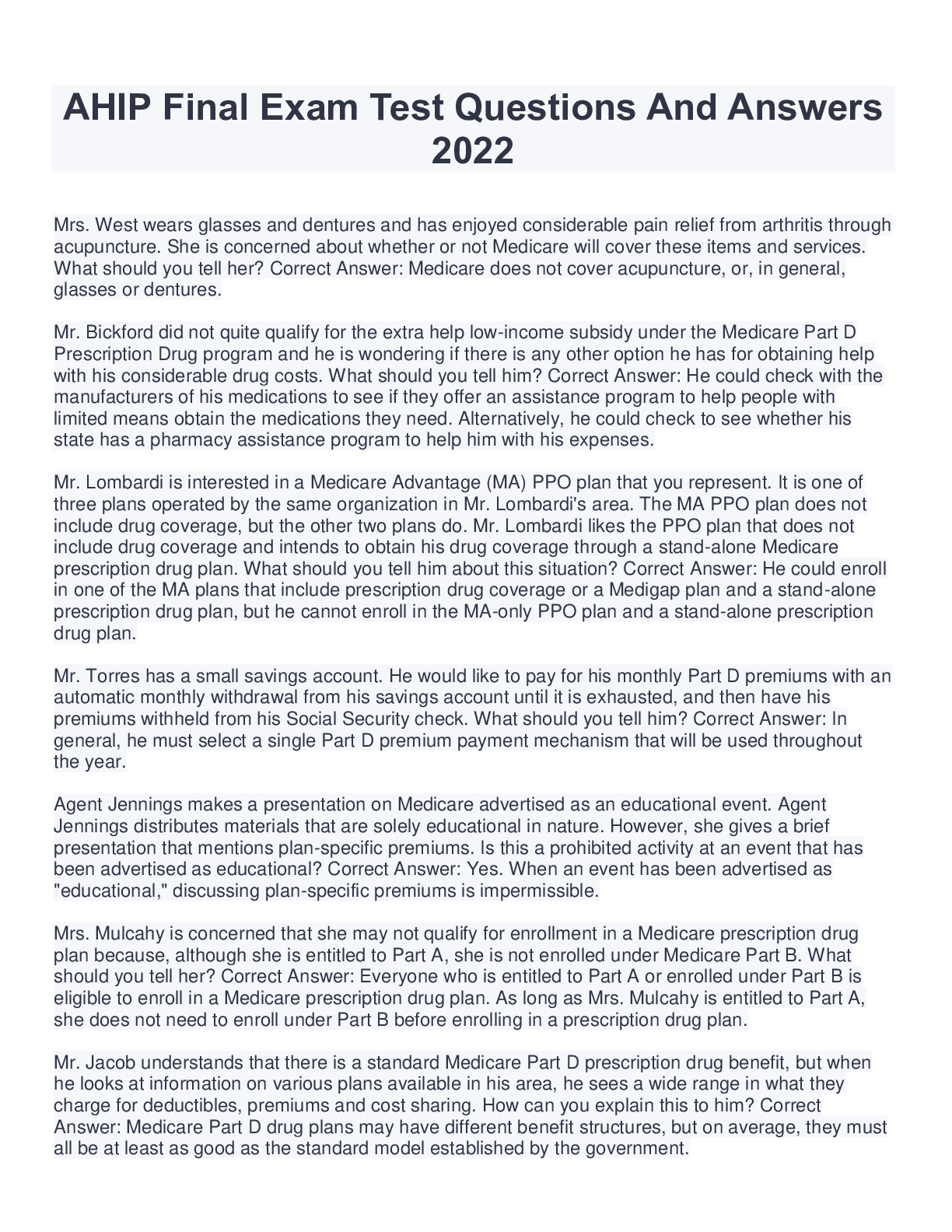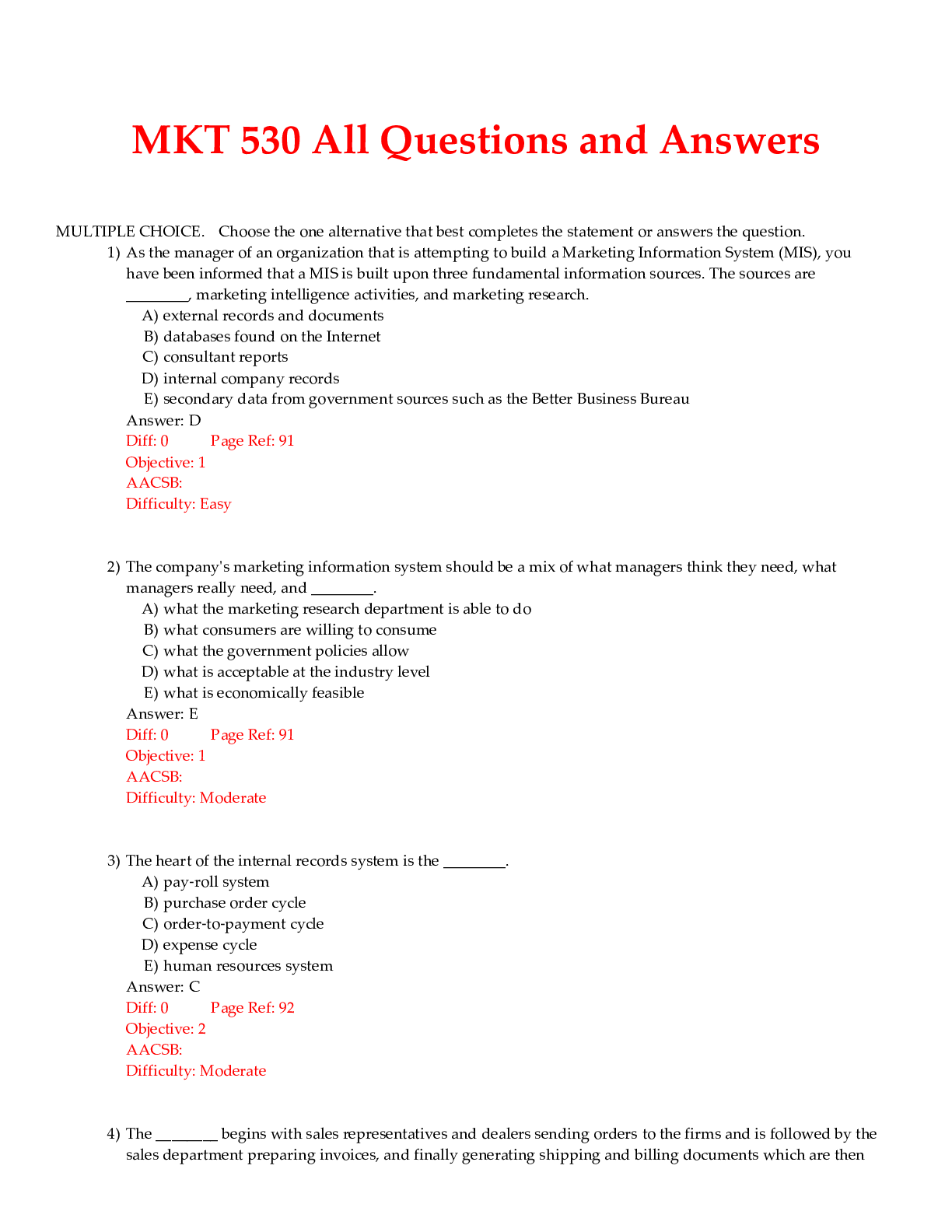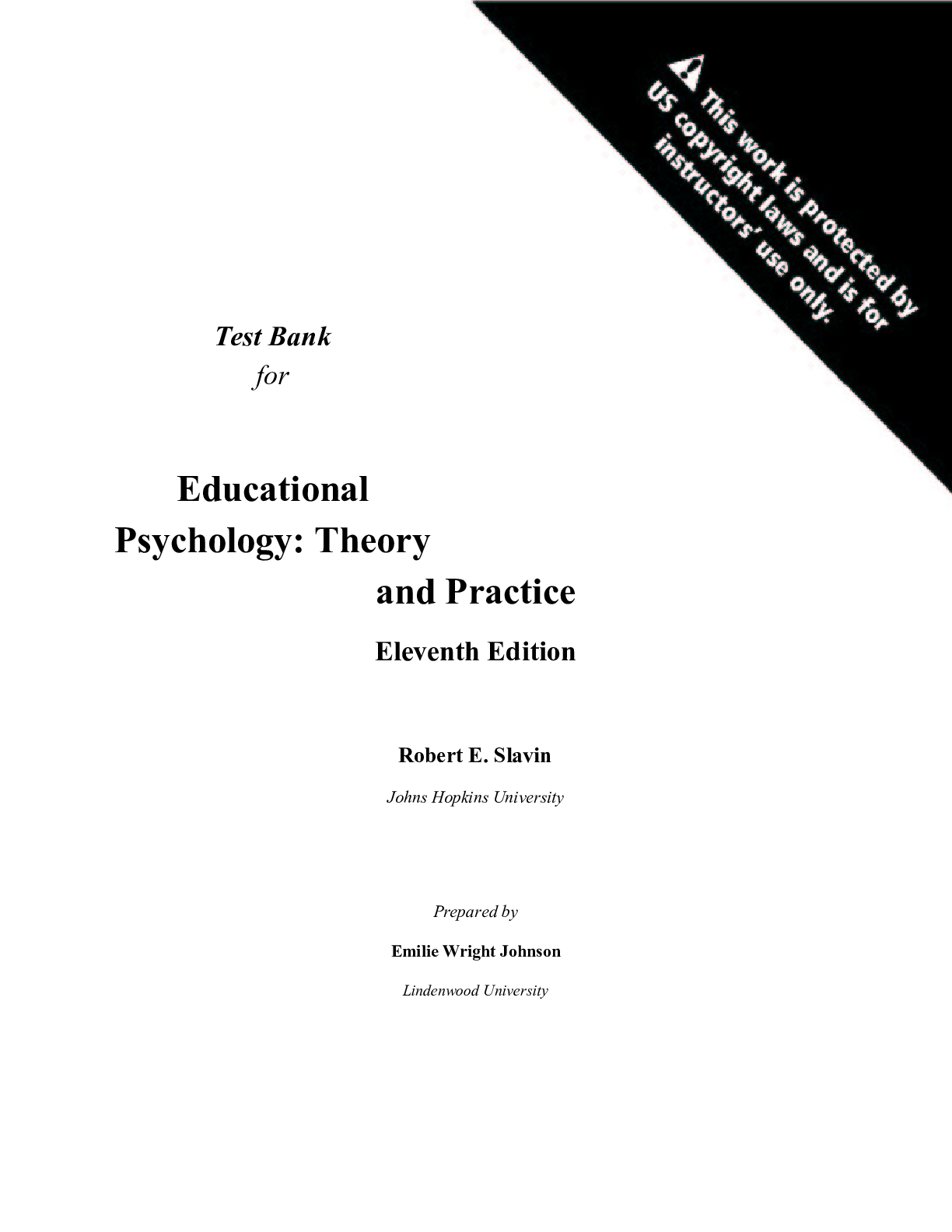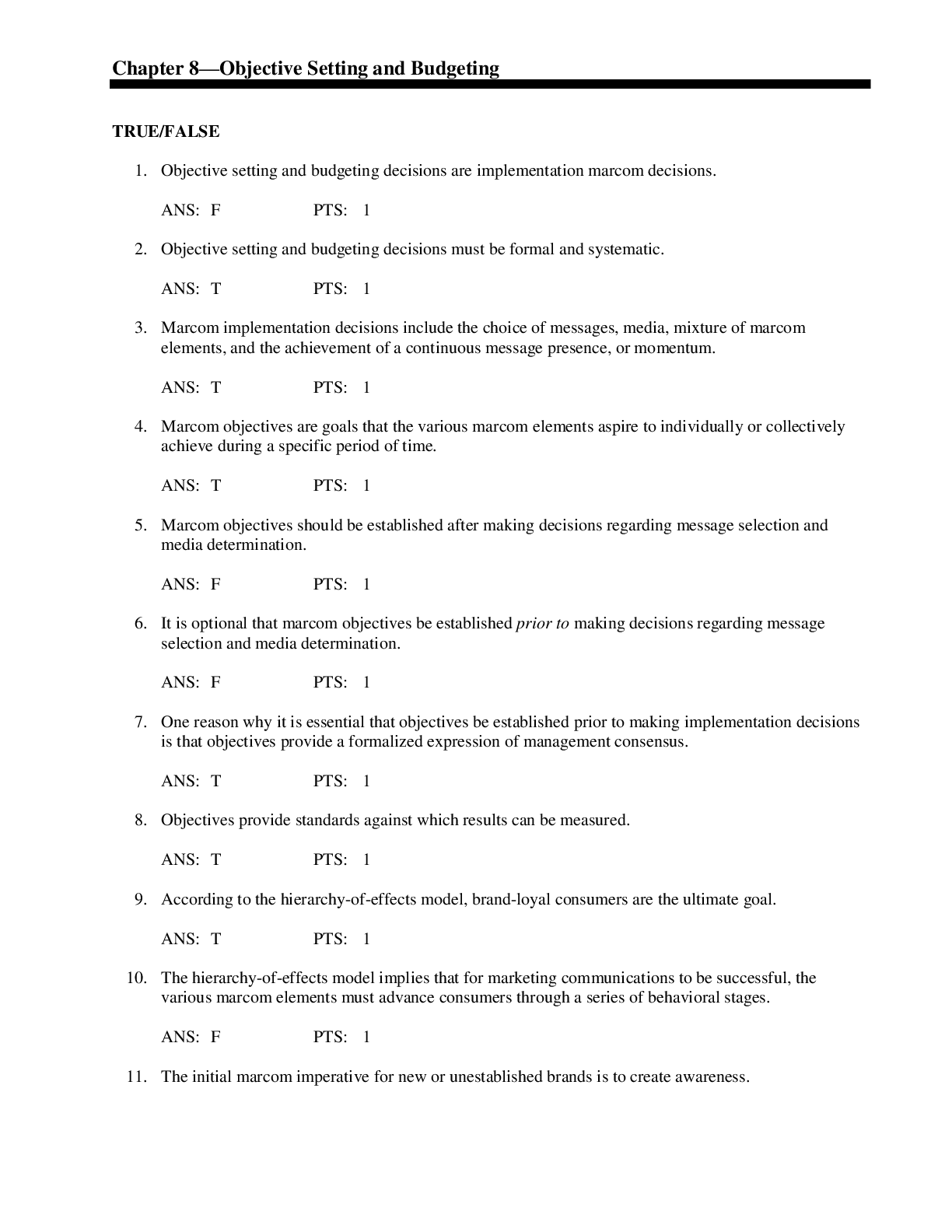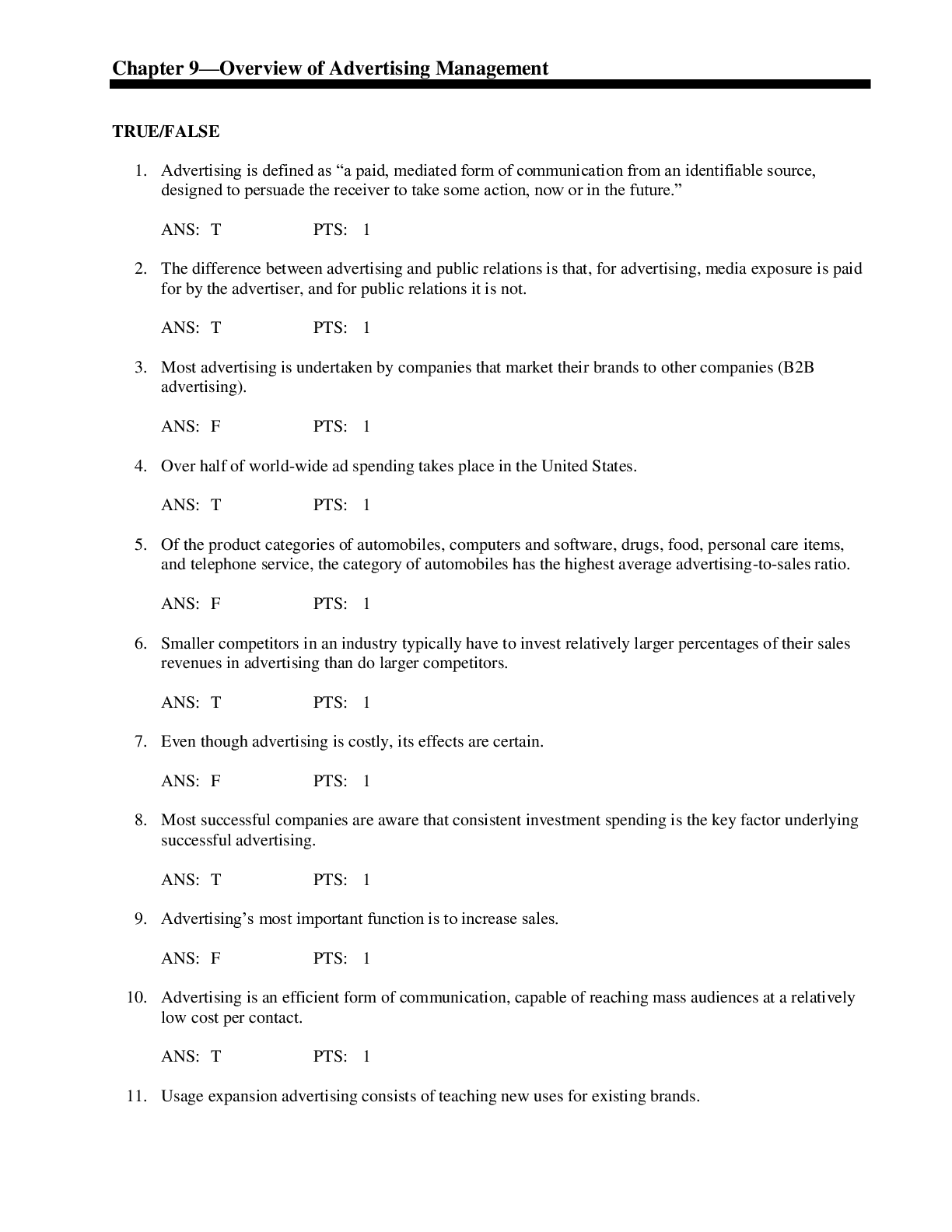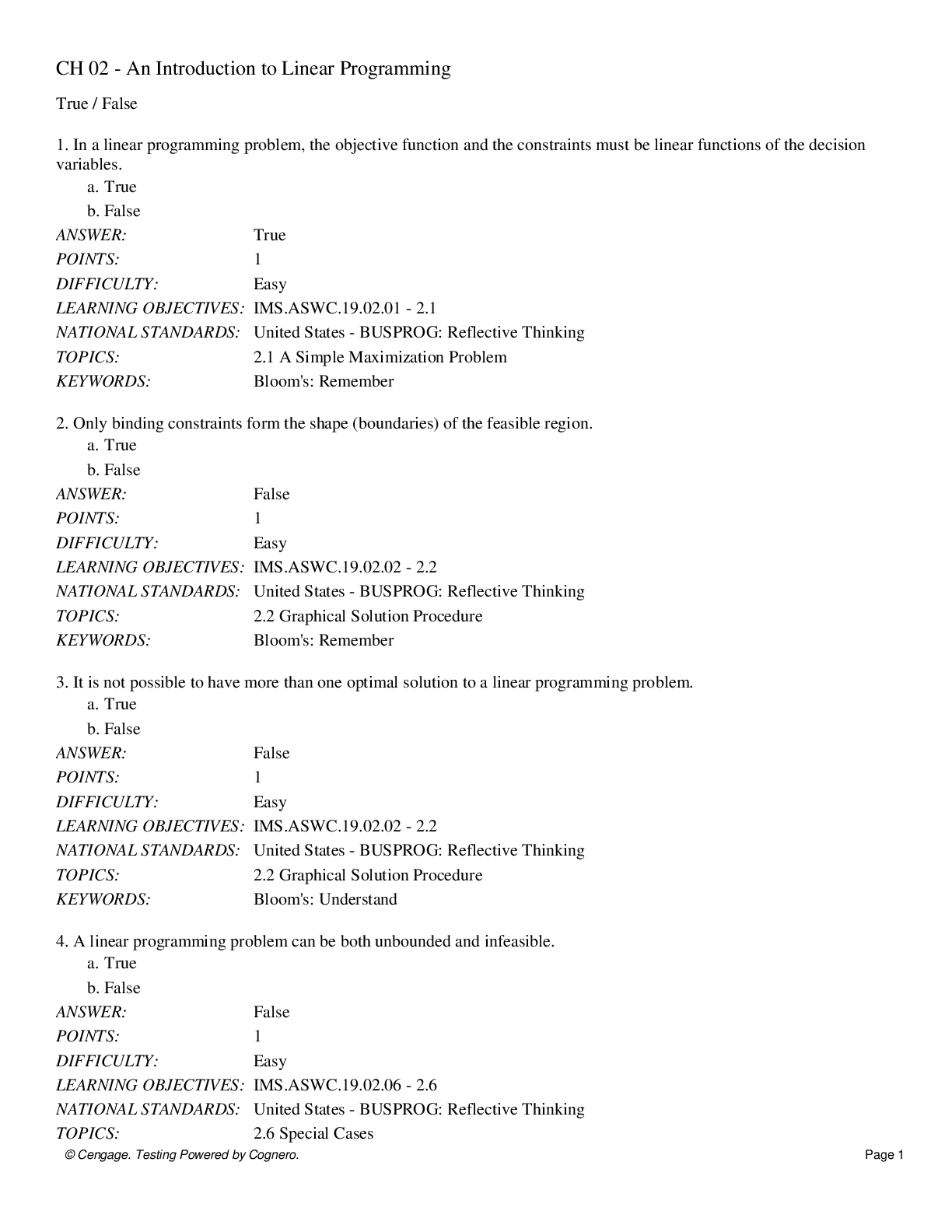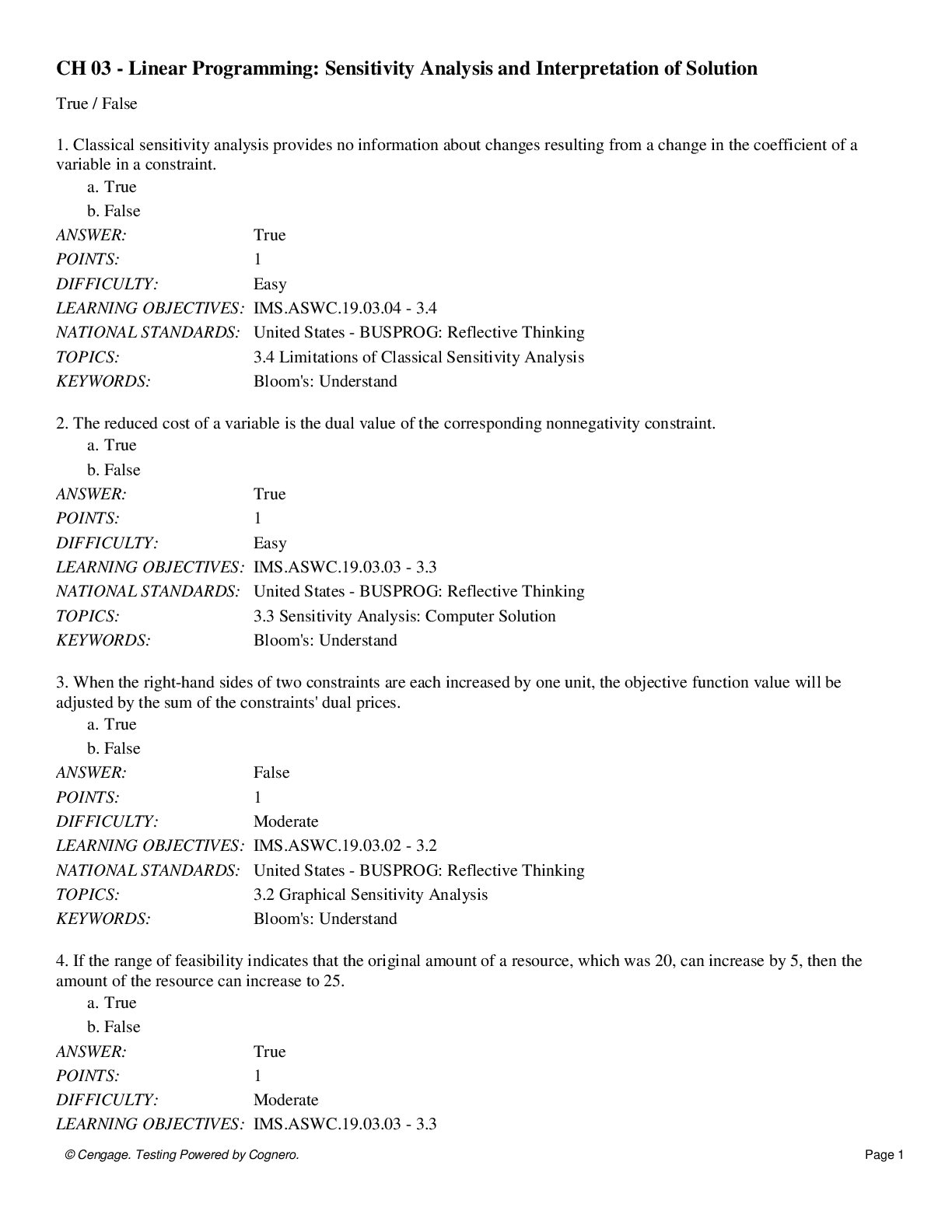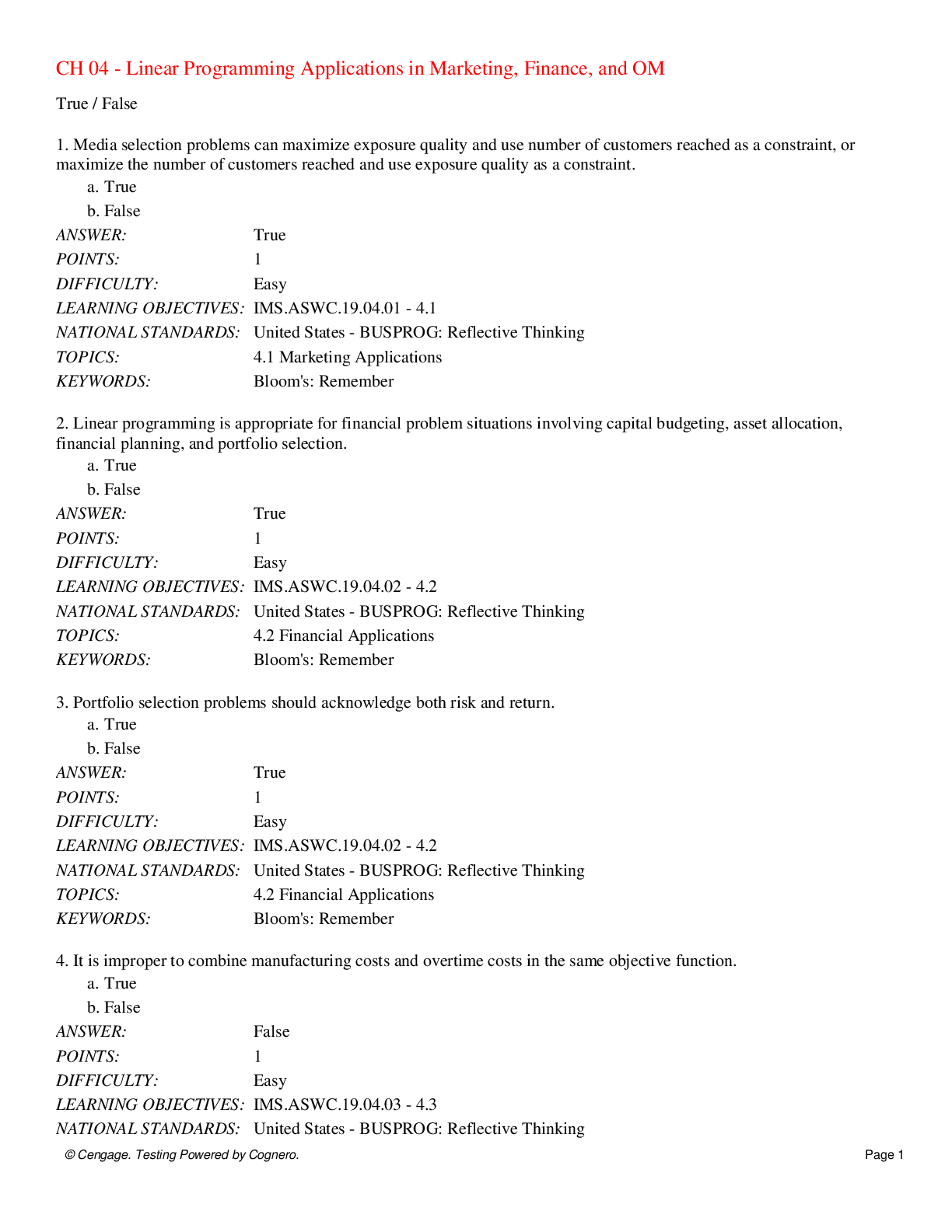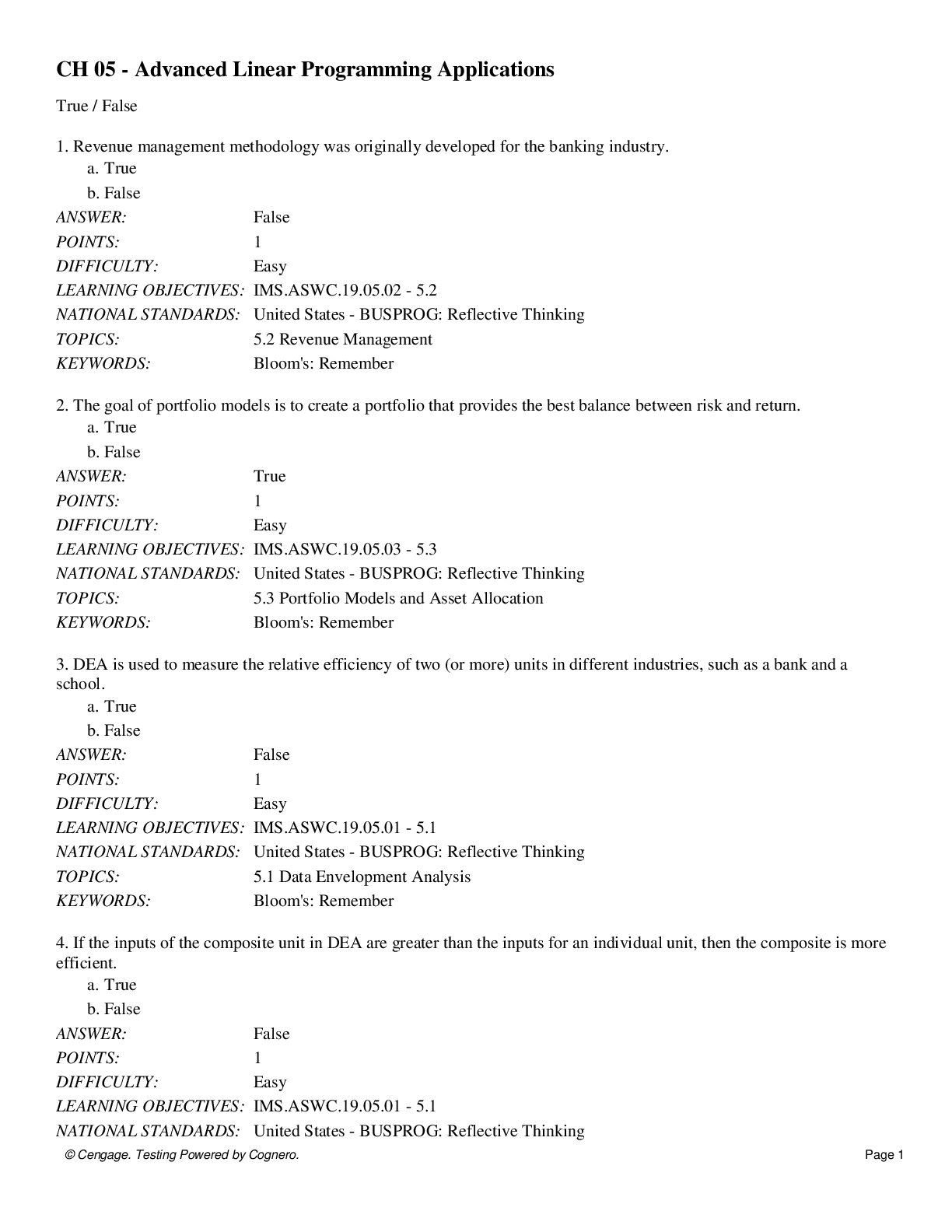Sociology > QUESTIONS & ANSWERS > SOCIOLOGY 185 FINAL PREP TEST QUESTIONS AND ANSWERS 2021 (All)
SOCIOLOGY 185 FINAL PREP TEST QUESTIONS AND ANSWERS 2021
Document Content and Description Below
SOCIOLOGY 185 FINAL PREP TEST QUESTIONS AND ANSWERS 2021 Question 1 5 / 5 pts (TCO 8) _____ is the incidence of childbearing in a country’s population, while _____ refers to maximum possible ch... ildbearing. Fertility; fecundity Active fertility; childbearing potential Birth rate; population growth Fertility; childbearing potential Fecundity; fertility Chapter 15 Question 2 5 / 5 pts (TCO 8) According to Emile Durkheim, while traditional, rural societies were built on _____, modern urban societies are held together by _____. likeness; difference difference; likeness money; morals trust; duct tape choice; conformity Chapter 15 Question 3 5 / 5 pts (TCO 3) The concept of modernity refers to changes in social patterns brought on by which of the following? The Fall of the Roman Empire The Enlightenment The Industrial Revolution World War I Globalization Chapter 16 Question 4 5 / 5 pts (TCO 3) What is an appropriate criticism of the Logic of Growth arguments? It is by no means logical. It ignores the globally dramatic increase in population. It is unnecessarily pessimistic. It assumes that natural resources will always be plentiful. No logic, no growth; know logic, know growth. Chapter 15 Question 5 5 / 5 pts (TCO 8) The environmental racism thesis falls within which theoretical approach? The structural-functional approach The sociobiology approach The symbolic-interaction approach The social-conflict approach The social-exchange approach Chapter 15 Question 6 5 / 5 pts (TCO 3) David Riesman believes that pre-industrial societies promote _____, while modern societies promote _____. collective ego; social ego other-directedness; traditional-directedness traditional-directedness; other-directedness social character; collective character family values; Manson family values Chapter 16 IncorrectQuestion 7 0 / 5 pts (TCO 3) Which theory states that social movements arise among people who feel they lack enough income, basic rights, or human dignity? Resource deprivation theory Relative mobilization theory Relative deprivation theory Resource mobilization theory Resource relativity theory Chapter 16 Question 8 5 / 5 pts (TCO 8) Medical science can keep a person’s body alive, on machines, long after their vital organs have failed. However, there is no agreement among religious and ethical leaders about how to decide when to unplug those machines. This example illustrates _____. Material culture Nonmaterial culture Cultural relativity Culture shock Culture lag Chapter 16 Question 9 5 / 5 pts (TCO 3) The concept postmodernity refers to which of the following? The material objects of societies that are already industrialized. Practices of societies that are just beginning to have computer access. The cultural traits of societies that keep their traditions. The norms and values of societies that are just beginning to industrialize. The cultural traits of postindustrial societies. Chapter 16 Question 10 5 / 5 pts (TCO 8) Of the various types of social movements, which is least threatening to the status quo? Alternative social movements Redemptive social movements Reformative social movements Revolutionary social movements Reactionary social movements Chapter 16 Question 11 Not yet graded / 40 pts (TCOs 1, 2, 3, and 4) Explain the steps in the process of carrying out sociological investigation. What specific questions must be answered as a researcher moves through their investigation? Your Answer: Sociological investigations are based on using scientific methods to collect data to understand social behavior. Basics of Sociological Investigation require: • Look at the world using the sociological perspective. • Being curious and asking questions. Research Design: An important aspect of sociological research is deciding how data should be collected. A research design is a detailed plan or method for obtaining data scientifically. Ten Steps in Carrying out Sociological Investigations: • Define the topic of investigation. • Find out what others have learned about the topic. • Assess the requirements for carrying out the research. • Specify the research questions. • Consider ethical issues. • Devise a research strategy • Gather the data • Interpret the data • State your conclusions • Share your results Elements of Scientific Investigation: • Concept is a crucial element of science. This is a mental construct that represents some part of the world inevitably in a simplified form. Example: describe an individual: race, gender class, • Variable is a measurable trait or characteristic that is subject to change under different conditions. Income, religion, occupation, and gender can all be variables. • A hypothesis is a statement about the relationship between two or more factors. Essentially, a hypothesis tells us what we are looking for in our research. • The use of variables depends on measurement, which is the process of determining the value of a variable in a specific case. • Measurement of a variable can be a bit arbitrary unless we have a specific definition of what we want to know or mean to measure. Hence, we need to specify exactly what we want to measure and assigning a value to each variable. • Representative Sample In most studies the researcher must select what is known as the sample. A representative sample is a selection from a larger population that is statistically found to be typical of that population. The RANDOM SAMPLE is one of the most common samples used by social scientists. Reliability and Validity of Measurement: • Reliability is the ability of the research measurement tool to yield the same results over and over again. • Validity means that there is a need for the research measurement instrument to measure precisely what one intends it to measure. Chapter 1 Answer should include: What is your topic? What have others already learned? What, exactly, are your questions? What will you need to carry out research? Are there ethical concerns? What method will you use? How will you record the data? What do the data tell you? What are your conclusions? How can you share what you’ve learned? Question 12 Not yet graded / 40 pts (TCOs 3 and 8) You have been asked by a committee of student success coaches to investigate why the rate at which freshman students post to their course threaded discussions is lower than the rate for other groups of students. Explain how the social-conflict perspective would analyze and explain the low posting rate. (In other words, consider the contributing factors that the social-conflict perspective would focus on in trying to explain the reasons for the low rate of students posting to their threads.) Then discuss a solution that a conflict theorist might use to encourage freshman students to post. Your Answer: First, the SI perspective would analyze why the discussion posting is low based on the meaning the situation has created. Since freshmen are new to campus they are enjoying new freedoms. While discussion posts are important, they might feel that it is a small portion of their grade. They then pass that idea around as they make friends. They would rather use the time to spend with their new friends then do non-essential work, which supersedes the fact that they are still being graded. An SI might then suggest to buddy up with upperclassmen that can emphasize the importance of posting in the discussions to keep their grades up. Chapter 1 covers the basic elements of the core sociological theories. In addressing the first part of this question, students will need to demonstrate that they understand the basic ideas and concepts of conflict theory. In addressing the second part of this question, students will need to demonstrate that they can offer a solution to the problem based on conflict theory. Question 13 Not yet graded / 40 pts (TCOs 6 and 7) Contrast mass-society theory with class-society theory and give a criticism of each. Your Answer: How about first we start with some definitions. Mass society theory- modernity increases the skill of life, enlarging the role of government in other formal organizations. Class society theory-modernity involves the rise of capitalism into a global economic system resulting in persistent social inequality. While I would say the United States is an example of both of these theories, I think this is probably an oversimplification of the answer you are looking for. We can then go to Media as an example of Mass Society Theory. A criticism of this would be not all people are mindlessly influenced by the media. People will interpret the media within their own beliefs. As criticism of Class society Capitalism is less exploitive today. As an example, I would have to explicitly use Henry Ford. He realized that by paying his workers a good wage they could then afford to buy the cars they were making. He made it so that class was not a deterrent to buying a car. Chapter 16. The answer should include a discussion of the differences between class-society and mass-society theories and their criticisms. Conventional goals with socially accepted means. Question 14 Not yet graded / 40 pts (TCOs 3, 4, and 6) Identify and describe the three leadership styles. Provide examples of these styles in society. Your Answer: 1. Authoritarian- They make the decisions they think are best. Underlings do what they are told and are not given a choice. This position easily leads to an abuse of power. This can lead to resentment from the minions. A good example of this is Gru in Despicable Me 2. Democratic- Here the leader tries to include everyone in the decision making. They try to implement what everyone wants. Many times, because they try to please everyone, they lack real power, seem wishy-washy, and lack a formal position. An example of this can be how we look at Canada. ? 3. Laissez-faire is where there seems to be no leader. Everyone functions without much interference. It is similar to having no leader. It lacks direction, feedback, and praise. An example of this would be King Louis XV. His stance on economic could be one of the reasons Louis XVI lost his Chapter 5 Question 15 Not yet graded / 40 pts (TCOs 5, 6, and 8) Define and give examples of ascribed status, achieved status, master status, role conflic,t and role strain. Your Answer: • Ascribed status is a social position you are born into or with (An example is being female. I have no control over it. I was born with it.) • Achieved status is a social position you earn through your own merit, you earned if you worked for it (An example would be Collage Professor or Doctor- brownie points? ?- just seeing if you are reading this.) • Master status is the one status that defines you. It is the role at the core of your social identity (a caregiver is an example of this. I am known to be the one to call if you need care). • Role Conflict is the incompatibility of expectations from two different status one occupies at the same time (boss and mom, they can go together, but they are so hard to balance). • Role strain the different roles from the single statues that one occupies at the same time (kid’s driver's ed at the same time as a personal doctor’s appointment.) • Role exit is the leaving the role that one has occupied a long time (retirement- what a special time- I do not believe I will get away with eating bonbons and watching TV). Chapter 4. Ascribed status is a social position you are born with or into (being male), achieved status is a social position you earn through your own merit (college student), master status is the one status that you occupy that most clearly defines who you are (usually your occupation), role conflict is the incompatibility of expectations from different roles from two statuses that you occupy at the same time (boss and family both need you at the same time), role strain is the incompatibility of expectations from different roles from a single status that you occupy (daughter’s science fair is at same time as son’s Math Olympics). [Show More]
Last updated: 1 year ago
Preview 1 out of 9 pages
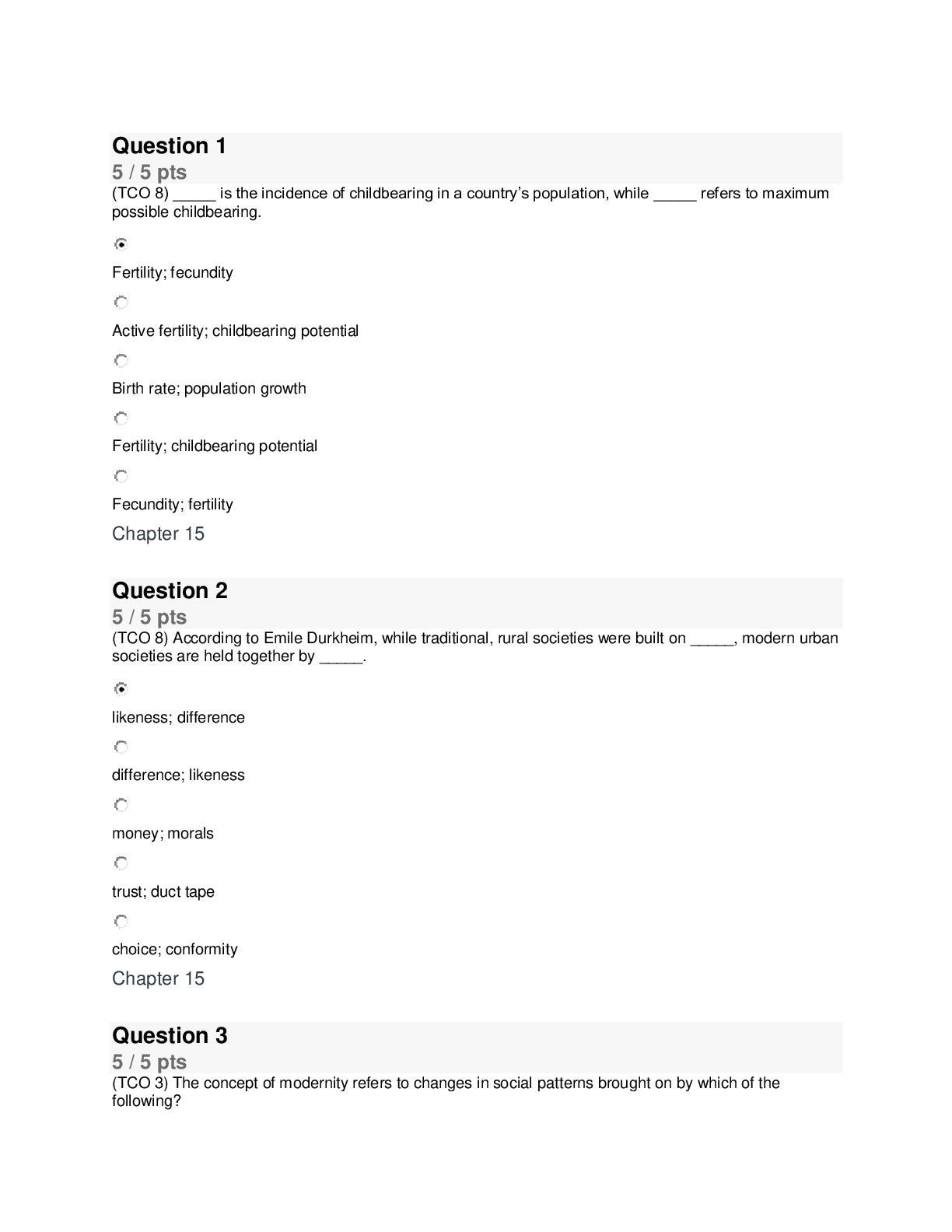
Buy this document to get the full access instantly
Instant Download Access after purchase
Add to cartInstant download
We Accept:

Reviews( 0 )
$8.00
Document information
Connected school, study & course
About the document
Uploaded On
Jan 07, 2021
Number of pages
9
Written in
Additional information
This document has been written for:
Uploaded
Jan 07, 2021
Downloads
0
Views
46

